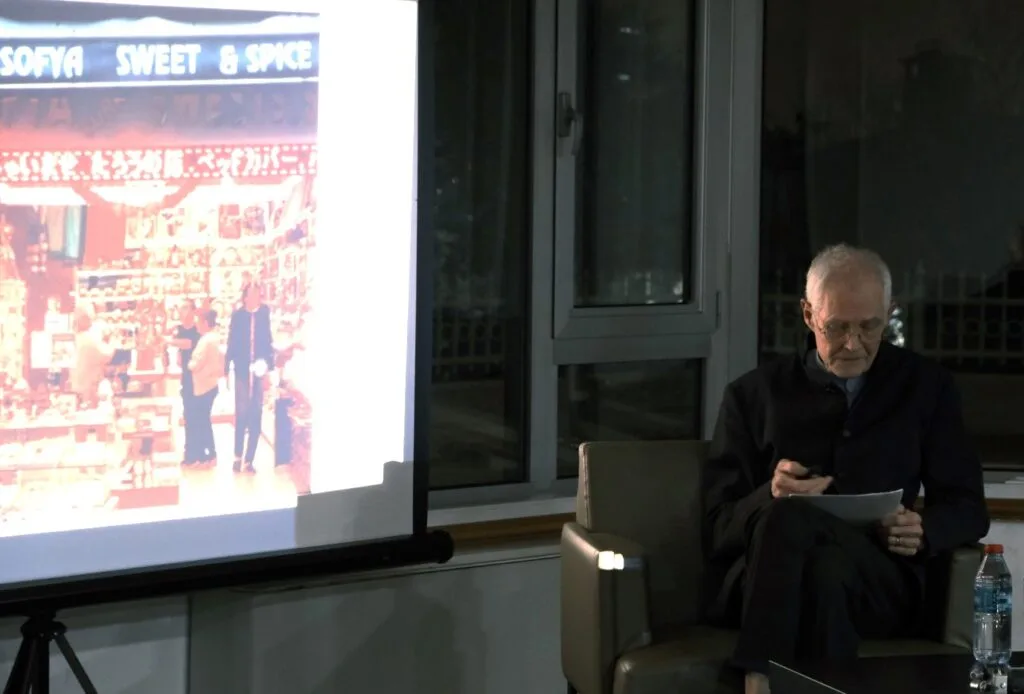Workshop “Linguistic Landscape of Istanbul: Possibilities and Prospects”
Author: Ruth Bartholomä
22 December 2023
Linguistic landscape research is a new approach in the field of sociolinguistics. It deals with representations of language in public spaces, for example in the form of street and store signs, billboards, regulatory and informative signs or graffiti. The focus increasingly shifted from a mere “counting the languages” on signs to more comprehensive approaches, including sociolinguistic descriptions of the neighborhoods, interviews with the authors and recipients of these signs, the languages used and the relationship between them as represented in the signs, and others. Since the establishment of the term “linguistic landscape” by Landry & Bourhis in their groundbreaking study from 1997 [1], the field has developed swiftly. The Orient-Institut Istanbul in cooperation with the University of Potsdam has created a Linguistic Landscape corpus with data from two districts in Istanbul (Kumkapı and Tarlabaşı). The corpus serves as the basis for an ongoing dissertation at the University of Potsdam and will also be published so that the collected data can be accessed by other researchers.

Linguistic landscape research on Istanbul or other towns in the Republic of Turkey or in Turkish-speaking regions elsewhere are rather rare and scattered. The workshop “Linguistic Landscape of Istanbul: Possibilities and Prospects”, organized by İstanbul Büyükşehir Belediyesi, Orient-Institut Istanbul and University of Potsdam was the first event bringing together academics in the field of linguistic landscape studies who work on Istanbul, Turkey or Turkish-speaking regions. We hoped to stimulate discussions on methodological questions, such as the compilation of corpora, and to identify common research questions and topics, thus enabling future joint research.
In response to a Call for Papers that we had published in the summer of 2022, we received numerous excellent proposals, from which we selected nine for presentation. This included both completed and ongoing research work. The workshop was originally planned for 23–25 February 2023, but due to the devastating consequences of the earthquakes in Turkey on 6 February, we decided to postpone it. Fortunately, all of the original participants were able to come to the new date, and we were even able to attract another speaker.
The workshop began on the evening of 30 November 2023 with a public keynote lecture by Prof. Dr. Florian Coulmas (IN-EAST Institute of East Asian Studies, Duisburg-Essen University, Germany) in the Atatürk Library near Taksim Square (Istanbul). The workshop participants and numerous interested listeners followed the fascinating talk with the title “The Linguistic Landscape: What We Can Learn from It” in which Professor Coulmas, a well-known sociolinguist, talked about the connections of linguistic landscape with other fields such as politics, history and legislation. After an introduction into the field of linguistic landscape research, Professor Coulmas presented his approach, namely a collection of eight Wh-questions, which he then applied to numerous examples from the linguistic landscape of countries such as Germany, the Netherlands, China and Japan. The examples from Japan he had collected during his ten-year term of office as director of the “German Institute for Japanese Studies” (“Deutsches Institut für Japanstudien”, an institute of the Max Weber Foundation).

Over the following two days, the workshop participants met in a conference room of the research library at the Florya campus of İstanbul Büyükşehir Belediyesi (Bakırköy, Istanbul) to present and discuss their projects. In addition to a discussion on ways to explore historical linguistic landscapes, several participants presented their ongoing research on the current linguistic landscape of different districts of Istanbul, while other projects focused on Ankara and Diyarbakır.
The range of perspectives from which the topic was examined was particularly exciting: For example, in addition to the question of multilingualism in Turkey in general, the focus was repeatedly and explicitly on English. Several projects were dedicated to pedagogical issues, including the problem of how linguistic landscape research can be integrated into university seminars, as well as the presence of signs in private and public educational institutions. Another project investigated literary forms in the linguistic landscape of a district on the Asian side of Istanbul. Also, the participants discussed theoretical and methodological problems that arose during the collection and analysis of the data. The question of whether and how the collected corpora should be made accessible and what advantages and disadvantages could result from this was also debated, as were questions of data protection and data maintenance. Presentations and discussions also addressed issues of migration, the refugee crisis and globalization.

The entire meeting took place in an extremely productive and collegial atmosphere. The participants agreed that the exchange should be continued; this will initially take place via a mailing list which will be used to exchange information on projects and publications as well as for questions. The organization of joint panels at national and international conferences and a further workshop were also discussed.
[1] Landry, Rodrigue/Richard Y. Bourhis. 1997. “Linguistic Landscape and Ethnolinguistic Vitality. An Empirical Study”. Journal of Language and Social Psychology 16/1, 23–49.
Citation: Ruth Bartholomä, Workshop “Linguistic Landscape of Istanbul: Possibilities and Prospects”, Orient-Institut Istanbul Blog, 22 December 2023, https://www.oiist.org/workshop-linguistic-landscape-of-istanbul-possibilities-and-prospects/